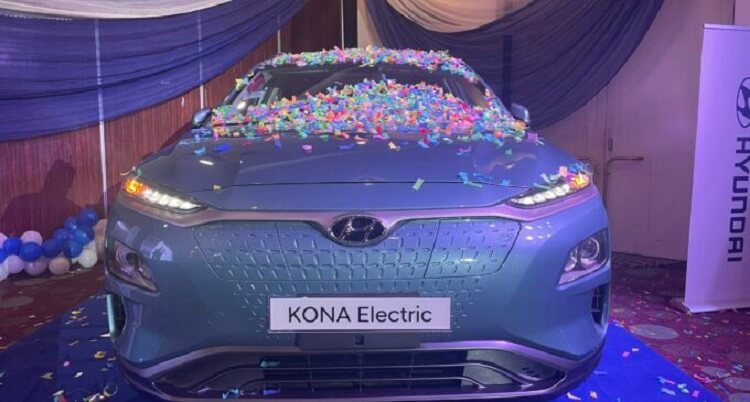Despite the epileptic power supply to Nigerians, the Federal Government on Friday unveiled Nigeria’s first locally assembled electric car, the Hyundai Kona.
The locally assembled electric car was officially unveiled by the Mimister of Industry Trade and Investment Adeniyi Adebayo.
Advertisement
He was accompanied by the Minister of Works Babatunde Fashola, the Director-General of the National Automotive Design and Development Council, Jelani Aliyu and Managing Director of Stallion Motors Mr Anant Badjatya among other top officials in both the public and private sector.
The Electric Vehicle, which was assembled by the Stallion Group Automobile, has been tagged as an innovation that will enable Nigeria and Nigerians to benefit from the gains in renewable and sustainable energy.
This innovation is expected to help foster an eco-friendly environment.
The Electric car was regarded in the European motoring industry as the world’s number one, and it costs about N24m.
Advertisement
However, the material used to assemble the 100 per cent electric and zero-emission car was mostly sourced locally.
With the launch of the Nigerian-made Electric Vehicle, Nigeria joins the rest of the world in embracing the recent innovation in energy mobility towards electric cars, courtesy of Hyundai and the Stallion Group.
This innovation is an open letter from Nigeria to the rest of the world, as it shows the country’s seriousness about a clean environment through clean and other sustainable energy options.
This new development is a move towards replacing internal combustion engine-powered vehicles with electric vehicles, in a bid to reduce environmental pollution and keying into an eco-friendly green environment
But all these may not be easily achieved as the Federal government had failed to meet its target to deliver at least 10 Giga Watts of electricity by 2020, as spelt out in the Economic Recovery and Growth Plan.
Advertisement
The strategic objectives of the ERGP which was launched by the government in 2017 included restoring growth, investing in people and building a competitive economy.
It also targeted a seven per cent GDP growth rate by 2020, driven by strong non-oil sector growth anchored by agriculture and food security energy, transportation and industrialization.
Other focus of the ERGP includes to optimize the delivery of at least 10 GW of operational capacity by 2020 and to improve the energy mix through greater use of renewable energy.
THE WHISTLER findings showed that the transmission company only transmitted an all-time peak of 5.56 GW on January 7, 2021, which fell below the 10GW 2020 target.
Nigeria with about 12.5 GW of installed capacity has been able to distribute about 50 per cent of that capacity, resulting in shortage of electricity supply across the country.
The power sector had in recent times contended with various challenges such as structural problems that continue to hamper growth in the power sector.
Advertisement
Some of these challenges are shortage of gas supply for thermal plants, high levels of unpaid electricity bills, power theft and vandalism, and the level of outdated and poorly maintained transmission network.
But speaking at the unveiling event for the Electric Vehicle, Adebayo said that the Federal Ministry of Industry, Trade, and Investment, in collaboration with the National Automotive Design and Development Council plans for a migration from the use of conventional vehicles (powered by fuel and diesel) to alternative powered vehicles.
He said this is in consideration of environmental degradation caused by global warming.
He said, “Another benefit of this vehicle to the automotive industry is the reduction of queues at filling stations, most especially during times of scarcity. I am sure most of you can relate to that.
“All that will be required is setting up charging stations in our respective homes, at strategic locations like shopping malls, event centers and other social and economic clusters in major cities and subsequently nationwide.
“The National Automotive Design and Development Council is working on this.”
The Minister also said the ministry is working closely with NADDC to review the Auto Policy, which will create an enabling environment for all stakeholders in the Auto Industry.
He commended the NADDC for its efforts in the establishment of the pioneer electric vehicle charging stations in University of Nigeria, Nsukka; University of Lagos and the Usman Danfodiyo University, Sokoto.
“Electric cars, trucks and buses are now being built globally, their advantages in terms of zero emission of greenhouse gases, less components to service and maintain, will make it suitable for a developing economy like Nigeria,” he added.
On his part, Fashola said the benefits that the electric vehicles offer have made it compelling to quickly tackle the challenges in the power sector.
He said the Ministry of Works is currently working on 13,000 kilometers of road in the country, adding that with this, Nigerians would be able to enjoy their vehicles in an efficient manner.
The NADDC DG said that the Electric Vehicle is part of the Nigerian Automotive Industry Plan to boost local production of vehicles.
He said the technology behind the Electric Vehicle would empower businesses and enhanced the quality of lives of Nigerians.
He said as of 2019, about $1bn had been invested by auto companies in the local production of vehicles with over 400,000 installed capacity.



